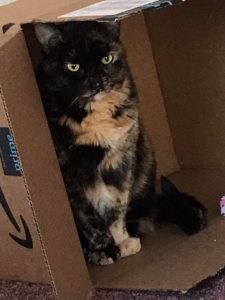 We recently lost a regal tortie just days before her 18th birthday. Olivia is now the only cat for the first time in her life. How is she managing? She still seems to be looking for Sophie and watching for her to walk down the hall to join us in the living room each evening. She
We recently lost a regal tortie just days before her 18th birthday. Olivia is now the only cat for the first time in her life. How is she managing? She still seems to be looking for Sophie and watching for her to walk down the hall to join us in the living room each evening. She appears to wait for her to enter my bedroom first thing in the morning and participate with us in my morning stretches like she has done ever since Olivia can remember. And Olivia is incredibly more affectionate and clingy since Sophie left us.
appears to wait for her to enter my bedroom first thing in the morning and participate with us in my morning stretches like she has done ever since Olivia can remember. And Olivia is incredibly more affectionate and clingy since Sophie left us.
It’s obvious to me that, although Olivia and Sophie were independent and they didn’t interact all that 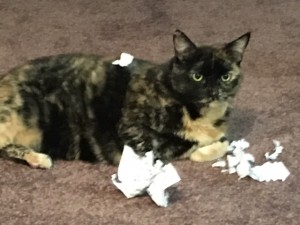 much, they counted on each other in some ways. They had become comfortable with the familiarity of each other’s habits and they seemed to rely on each other for some level of companionship. Sophie was always the one to ask for food. Olivia just tagged
much, they counted on each other in some ways. They had become comfortable with the familiarity of each other’s habits and they seemed to rely on each other for some level of companionship. Sophie was always the one to ask for food. Olivia just tagged 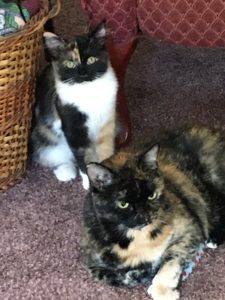 along for the ride. Sophie showed Olivia the way to the cheese treat—“when you hear that cheese package come out of the fridge you hot-foot it into the kitchen and mew until you get a few shreds.”
along for the ride. Sophie showed Olivia the way to the cheese treat—“when you hear that cheese package come out of the fridge you hot-foot it into the kitchen and mew until you get a few shreds.”
Even at Sophie’s age she would play with Olivia, but only occasionally. Olivia loved it when Sophie agreed to a chase or a wrestle-fest. We got a kick out of it when Sophie instigated the game and caught Olivia off guard. 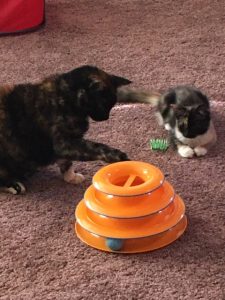 Do cats ever lose the kitten within?
Do cats ever lose the kitten within?
I went in search of the answer to the question I posed above. Do cats grieve? And I found that most cat experts and professionals believe they do. Jackson Galaxy says cats grieve the loss of a cat friend and he offers suggestions for helping the cat adjust: Keep to the cat’s routine as much as possible. Give the remaining cat(s) plenty of attention and affection. Set aside dedicated playtime for the cat(s) who is left.
When one cat leaves, you often learn something about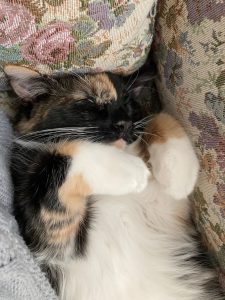 the remaining cat. For example, I thought Olivia was the exuberant litter box user—the one who kicked and tracked litter everywhere. I had to sweep up piles of it every day. Not anymore. Evidently it was our petite queenly cat, Sophie, having fun in the litter box.
the remaining cat. For example, I thought Olivia was the exuberant litter box user—the one who kicked and tracked litter everywhere. I had to sweep up piles of it every day. Not anymore. Evidently it was our petite queenly cat, Sophie, having fun in the litter box.
One thing I’ve watched for with Olivia is a change in her daily routine, activities, or mood. Yes, cats can become depressed or anxious and this isn’t something that should be taken lightly. It could be temporary, but some cats seem to experience higher anxiety levels that can cause serious health issues after a traumatic event or a change to the household. This happened to Sophie three times during her nearly 18 years—and once it was because of the loss of her cat friend, Lily. I also know a beautiful cat who was so traumatized by dramatic changes in his home environment that he could not be saved. He just gave up.
What are the signs of depression or anxiety? Lethargy, aggressiveness, unusual vocalizing, weight loss, lack of grooming or over-grooming, inappropriate urinating, and loss of appetite are a probably the most common. Here’s a great site to study if you have a cat that is showing any of these signs. This information might help you in the future, should your cat be subjected to something like the loss of a human or an animal friend, evacuation because of flooding or fire, or even a new member to the family—human or animal. https://www.veterinarians.org/cat-depression/






First we lost Daddy not quite a year and a half ago. Then we lost Lucy, our 15 year old sweetly. Zoey, who is 16, says this is just too much. She is showing signs of depression, but then, so an I. Soooo, the two of us are going to keep on keeping on. We snuggle, especially at night, and we keep hoping that th sun will come out tomorrow.
So sorry for your losses–too many too soon. Hugs to you and Zoey. Keep snuggling and caring.
Patricia
My sympathy for the loss of Sophie. She looks so much like my Winnie who passed when she was 15.
Thank you, Linda. Losing a cat is definitely the worst part of loving one.
Patricia
So sorry on your loss of Sophie. I know how hard it is.
Thank you, Kathy. Yes, anyone who has loved a cat knows how hard it is to love them.
Patricia